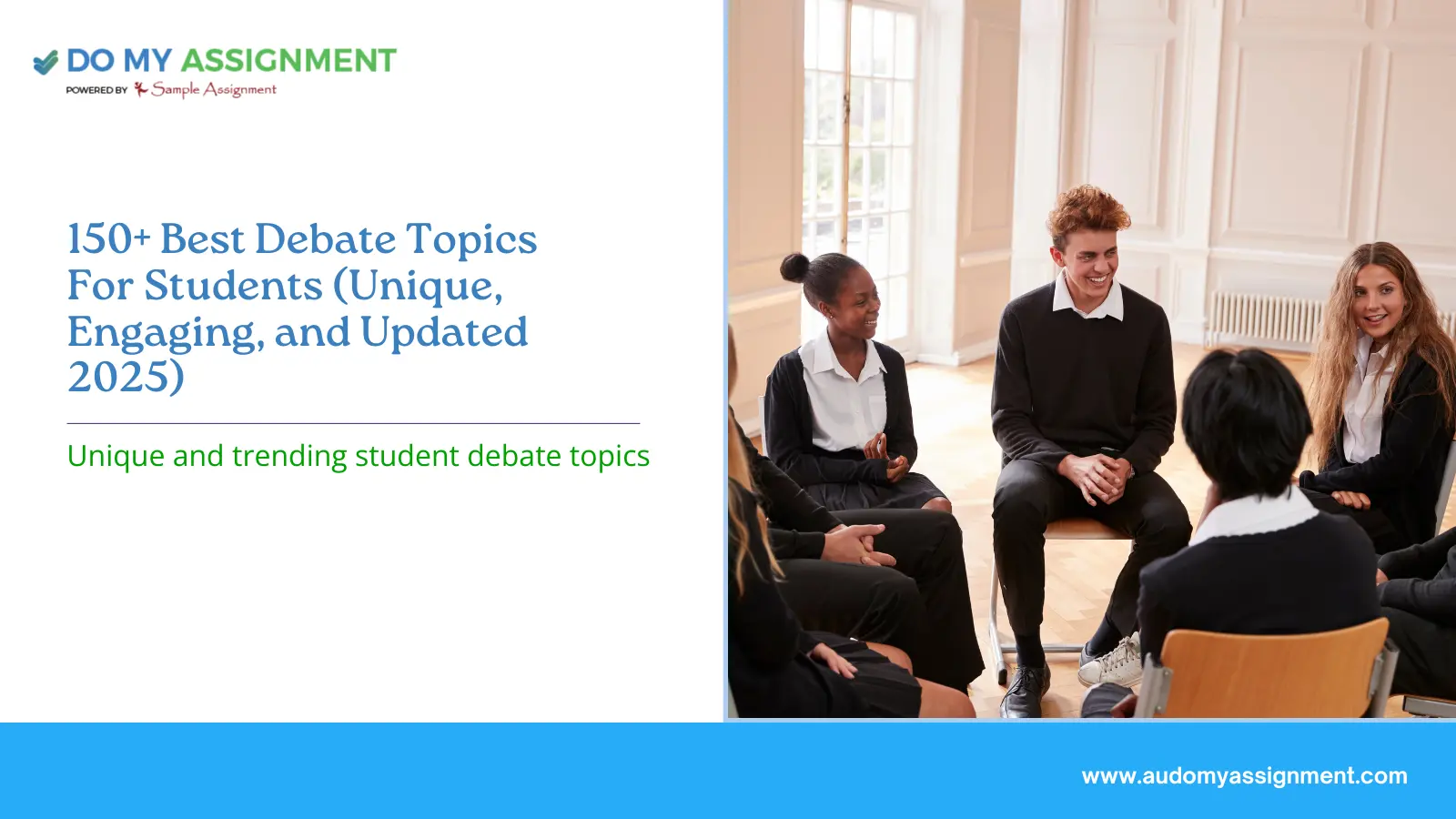150+ Best Debate Topics For Students (Unique, Engaging, and Updated 2025)

Highlights
Debates are one of the most engaging, challenging, and fun activities you can do that requires any form of intellectual effort. It is a formal discussion in which participants argue either in favor of or against a particular topic, intending to make the opponent accept their point of view. Debates can be fun if you are fully invested; it is also worth noting that you are more likely to be invested if the topic aligns with your interests. When it comes to choosing a topic for debate, students often get stumped. Choosing a topic can be difficult, as it is often challenging to navigate your interests while also considering the opponent’s position. However, choosing a topic is really easy once you clearly define and understand your requirements. In this blog, you will learn about the best debate topics that are trending in 2025 and topics that you can choose for your next debate.
How To Choose The Right Debate Topic?
Choosing a debate topic can be challenging, as we discussed earlier, but it isn’t impossible. Remember, your choice of topic should reflect your purpose and interests while also being engaging. Try to focus on the ‘relatability’ factor, as in your topic should resonate with your audience if you want to sway their opinion towards yours.
However, the best debate topics have a strong pro and con factor as well, meaning that there is no objective agreement on the topic whatsoever. Also, try to avoid topics that are more opinionated instead of fact-based. Remember to balance your topic between debatability, factuality, and opinion-based argumentation. This will allow you to find a topic that is the most effective for your audience.
Many people who write essays also use this same technique to find a good topic, especially when they are writing an argumentative essay. If you need help with writing an essay, then feel free to seek help Do My Assignment’s essay writing service for personalized support.
List Of Debate Topics For Australian Students (2025 Edition)
Now, let us dive into the individual topics that you must be looking for. Keep in mind that different people are comfortable with different topics, so you have to choose one that you would be more passionate about. Here are some of the best debate topics for each category listed below.
Debate Topics For Classrooms:-
(i) Should students be required to wear uniforms?
(ii) Should homework be banned?
(iii) Are video games a positive or negative influence on children?
(iv) Should junk food be banned in school cafeterias?
(v) Is social media good for friendships?
(vi) Should laptops and tablets replace textbooks in schools?
(vii) Is group learning better than self-study?
(viii) Should teachers be allowed to use mobile phones in classrooms?
(ix) Are field trips more important than classroom lessons?
(x) Should school days be shorter?
Debate Topics For High School Students:-
(i) Should the legal driving age be raised?
(ii) Should students be graded on class participation?
(iii) Should social media influencers be regulated by law?
(iv) Is it ethical for companies to collect data from minors?
(v) Should there be a mandatory gap year between high school and college?
(vi) Is a college degree a prerequisite for having a successful career?
(vii) Should schools teach financial literacy?
(viii) Is online education as effective as in-person learning?
(ix) Should students be able to choose their own classes?
(x) Is it better to be an introvert or an extrovert?
Debate Topics For College Students:-
(i) Should university tuition be free for all students?
(ii) Is it ethical to use artificial intelligence for academic research?
(iii) Should universities implement a “pass/fail” grading system?
(iv) Are unpaid internships unfair to students?
(v) Should universities get rid of standardized tests like SATs?
(vi) Should freedom of speech be limited on college campuses?
(vii) Should athletes in college be paid?
(viii) Is student loan debt a national crisis?
(ix) Should mental health days be a right for all students?
(x) Should mandatory volunteer work be a requirement for graduation?
Debate Topics For Youth:-
(i) Is technology making people lazier?
(ii) Should the minimum voting age be lowered to 16?
(iii) Is it better to read a physical book or an e-book?
(iv) Should young people have a greater say in government decisions?
(v) Are celebrities good role models?
(vi) Is it more important to be street-smart or book-smart?
(vii) Should parents monitor their children’s social media accounts?
(viii) Is it better to live in a city or the countryside?
(ix) Should children be raised as vegans?
(x) Is it important to learn a second language?
Debate Topics For Adults:-
(i) Should the retirement age be raised?
(ii) Is remote work more productive than office work?
(iii) Should there be a universal basic income?
(iv) Are social media platforms a net positive or negative for society?
(v) Should corporations have the same rights as individuals?
(vi) Is capitalism the most effective economic system?
(vii) Should there be a global tax on sugary beverages?
(viii) Is it ethical for governments to use facial recognition technology?
(ix) Should adults be required to perform one year of public service?
(x) Should we colonize other planets?
Debate Topics For Public Speaking:-
(i) Do the benefits of globalization outweigh its drawbacks?
(ii) All nations have a moral obligation to accept refugees.
(iii) Private ownership of firearms should be banned.
(iv) All forms of animal testing should be prohibited.
(v) Is space exploration a waste of resources?
(vi) All citizens have a right to free healthcare?
(vii) It is the government’s right to protect individual liberty.
(viii) Is the death penalty an ethical punishment?
(ix) Should the world transition to a vegetarian diet?
(x) All forms of censorship are wrong.
Debate Topics For Group Discussions:-
(i) What is our generation’s most significant problem?
(ii) Is there anything such as ‘objective truth’?
(iii) What is the most important quality in a leader?
(iv) Should parents be held responsible for what their child posts online?
(v) What are the modern world’s biggest challenges?
(vi) Should every country have a constitution?
(vii) What is the role of art in society?
(viii) Which valuable life skill is not taught in schools?
(ix) What is a ‘just’ war?
(x) What is a ‘good’ life?
Debate Topics For Online Discussions:-
(i) Are electric cars better for the environment?
(ii) Is cancel culture a good thing?
(iii) Will AI take over jobs?
(iv) Is it okay to lie to protect someone’s feelings?
(v) Is climate change irreversible?
(vi) Are self-driving cars safe?
(vii) Should tipping be abolished?
(viii) Is being an influencer a real job?
(ix) Should the monarchy be abolished in the UK?
(x) Are conspiracy theories harmless?
Controversial Debate Topics:-
(i) Should euthanasia be legal?
(ii) Is censorship ever justified?
(iii) Should prostitution be decriminalized?
(iv) Is it ethical to clone humans?
(v) Is ‘cultural appropriation’ a valid concept?
(vi) Should nations open up borders?
(vii) Is using animals for scientific research ethical?
(viii) Should the government track citizens for security purposes?
(ix) Is religion good or bad for society?
(x) Is it okay to boycott a country for political reasons?
Interesting and Fun Debate Topics:-
(i) Is a hot dog a sandwich?
(ii) Would you rather be able to fly or be invisible?
(iii) Which is better: cats or dogs?
(iv) Is pineapple on pizza acceptable?
(v) Should we have a four-day workweek?
(vi) Is it ever okay to lie?
(vii) Are aliens real?
(viii) Are movies better than books?
(ix) Should we be friends with our parents on social media?
(x) Is cereal a soup?
Unique Debate Topics You Won’t Find Anywhere Else
What we discussed just now were some of the most mainstream topics that you can easily find information about. One of the best strategies for winning debates is to surprise your opponent by raising an issue that they might not be well-informed about. These topics need to be easily understandable while also being obscure enough to confuse your opponent. Let us look at some of the best debate topics that you won’t find anywhere else.
The Philosophy of Technology:-
(i) Digital immortality through AI replication of consciousness is a legitimate form of life.
(ii) Technologically enhanced memory will erode human creativity and imagination.
(iii) Virtual reality can create a more authentic sense of community than the real world.
(iv) Development of autonomous technology absolves humans of the responsibility for its actions.
(v) Human reliance on algorithms for decision-making devalues the concept of free will.
(vi) Technological development should be halted until its ethical implications are fully understood.
(vii) The distinction between human and AI creativity would soon become meaningless.
(viii) Commodification of human data is an unethical violation of personal identity.
(ix) Post-human future would be a net positive for humanity.
(x) The quest to digitize all knowledge would lead to a shallow understanding of information.
The Future of Urban Design:-
(i) ‘Smart City’ technologies benefit the corporations rather than the public.
(ii) Green spaces should be prioritized over housing density.
(iii) Privately owned public spaces should be a criminal offense.
(iv) Urban planning should focus on decentralization rather than the expansion of megacities.
(v) Cities of the future should be designed for pedestrians rather than motorized vehicles.
(vi) Preservation of historical buildings should take precedence over modern urban development.
(vii) Local city councils should hold power for urban planning rather than the city governments.
(viii) Commercial property should be converted into residential property to combat the housing crisis.
(ix) Cities should be designed to be self-sufficient in food production.
(x) Unless the existing population is housed, no new cities should be built.
Modern Media and Human Cognition:-
(i) The impact of short-form videos on human attention spans.
(ii) Obligation of social media platforms to limit users’ screen time.
(iii) Do true crime podcasts normalize violent behavior?
(iv) The rise of nostalgia-driven media is a sign of societal regression.
(v) Increasing usage of emojis is eroding our language skills.
(vi) Digital filters damage our sense of identity and self-worth.
(vii) Podcast-based learning is a poor substitute for traditional academic learning.
(viii) The entertainment industry should produce more thought-provoking content.
(ix) The Internet has severely damaged humans’ ability to retain information.
(x) The constant availability of news has made us less informed about the world.
The Ethics of Food and Agriculture:-
(i) The ethical and health implications of eating lab-grown meat instead of animal meat.
(ii) Corporate agriculture vs food sovereignty as solutions to world hunger.
(iii) The use of genetic modification in crops.
(iv) The ethics of subsidization of agricultural exports by developed countries.
(v) Schools should teach students how to grow their own food.
(vi) The sustainability of the “farm-to-table” movement.
(vii) Customer or corporation? Who bears the responsibility for sustainable food production?
(viii) Global tax on sugary beverages and processed foods.
(ix) Should overfishing of oceans be considered a crime against humanity?
(x) Should the government nationalize food production?
Tips For Winning Any Debate
Winning a debate can be either easy or difficult depending on your preparation and the opponent’s skill, but you can definitely make it easier. Here are some effective tips to increase your chances of winning any debate.
Tip 1
Focus more on the rebuttal than your speech; make the opponent go on the defensive with your counterattacks.
Tip 2
Instead of listing facts, structure your argument like a story.
Tip 3
Speak with confidence and command the attention of your audience and the opponent.
Tip 4
Evidence shouldn’t be your backup; it should be your weapon, and you should use it offensively against the opponent.
Tip 5
Begin your speech with statements that automatically shift the debate’s tide in your favor; don’t let your opponent command the discussion.
Debate Topics With Pros And Cons
A good debate topic has no clear advantage or disadvantage to one side of the argument. Essentially, a topic in which both sides have a certain advantage over the other, while also having a thorn on their side, is a topic worth debating. For example, let us look at a popular technological debate topic, “Should the use of AI in daily life be restricted?” and analyze its pros and cons.
Pros:-
Job Security
Limited usage of AI can protect human jobs from automation.
Ensures Ethical Use
Regulations can prevent AI from being used in unethical processes such as facial recognition, surveillance, and automated decision-making.
Maintains Human Connection
Limiting the use of AI will allow human creativity and imagination to develop and shine.
Cons:-
Stifles Progress
Restrictions can hinder the growth of businesses and also disable technological advancements in the short run.
Economic Disadvantage
Nations that restrict AI may fall behind when it comes to economic growth and industrial development.
Inevitability
The development of AI is almost impossible to stop now, which means AI has to be accepted at some point or the other.
Frequently Asked Questions About Debate Topics
What are the best debate topics for beginners?
Assuming you are a beginner, it is recommended that you focus on the most common topics that have been trending for a while now. You can try your hand at social issues debate topics, education debate topics, technology debate topics, or a combination of the three. Some examples of topics include “Do video games have a positive or negative impact on a child’s development?”
How do I prepare for a debate?
Preparing for a debate is easy; all you have to do is compose yourself and approach the debate topic like a researcher. You have to research both sides of the argument and understand the reasoning behind your opponent’s claims as well as your own.
What are some controversial debate topics in 2025?
Generally, argumentative debate topics tend to be the most controversial; however, new topics have emerged that generate significant controversy. Some controversial debate topics in 2025 are concerned with artificial intelligence, data privacy, climate change policy, social media regulation, genetic engineering, etc.
Which debate topics are good for competitions?
Debate topics for competitions tend to be sophisticated, requiring intellectual depth, critical thinking, and skillful argumentation. Some of the best debate topics for competitions include ‘Universal Basic Income,’ ‘Foreign Aid and Human Rights,’ ‘Limits of Freedom of Speech,’ and ‘Should Voting be Mandatory?’ ‘Ethical Consumerism,’ etc.
Final Thoughts
In the end, choosing a debate topic is not nearly as hard as many students think it is. All you need to do is clear your mind, define your objectives and interests, and then make the choice of topic. If you need more help finding the best debate topics that are trending in 2025 or just help with preparation for debate, feel free to contact Do My Assignment. We will help you prepare for your debate so effectively that you will win even before the debate begins.
Nick Johnson
Nick is a multi-faceted individual with diverse interests. I love teaching young students through coaching or writing who always gathered praise for a sharp calculative mind. I own a positive outlook towards life and also give motivational speeches for young kids and college students.








